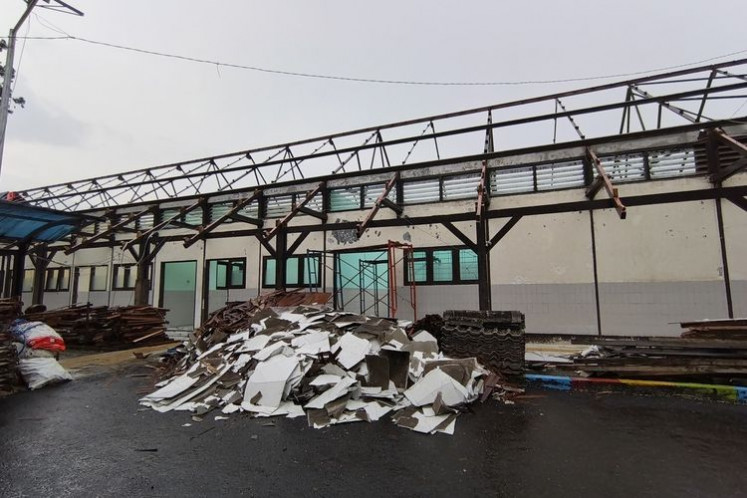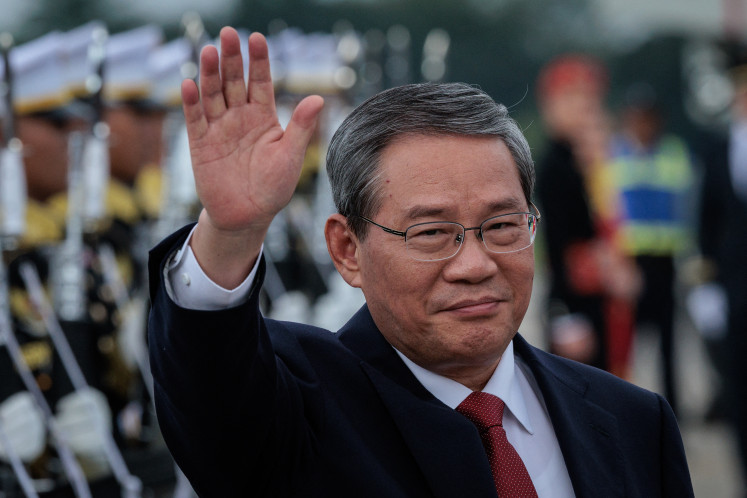Proper LNG import policy could stimulate gas industry
Fill it up: A floating storage regasification unit (FSRU) belonging to PT Nusantara Regas (left) receives its first LNG supply in 2018 from LNG carrier Aquarius operated by PT Pertamina Hulu Mahakam in Jakarta Bay
Change text size
Gift Premium Articles
to Anyone

F
ill it up: A floating storage regasification unit (FSRU) belonging to PT Nusantara Regas (left) receives its first LNG supply in 2018 from LNG carrier Aquarius operated by PT Pertamina Hulu Mahakam in Jakarta Bay. Gas prices for industry remain high in Indonesia, despite the country being one of the world’s major gas producers. (JP/Ben Latuihamallo)
President Joko “Jokowi” Widodo has ordered his Cabinet to evaluate the possibility of supplying natural gas to consumers at US$6 per million British thermal units (MMBTU). The President outlined three measures he wanted addressed: First, reduction of the government’s share in the gas sales price; second, the use of a domestic market obligation (DMO); and third, permitting the private sector to import lower cost liquefied natural gas (LNG) from foreign sources.
At least two national objectives drive this imperative: First, the need for Indonesia to be a competitive manufacturing economy in both the domestic and the export sector; and second, the attraction of capital, foreign and domestic, to support the expansion of the manufacturing sector and create employment opportunities. The accomplishment of these goals would improve Indonesia’s position in the global value chain (GVC).
The reduction of the government’s share in oil and gas operations seems a likely possibility. Indonesia’s economy has broadened into a multidimensional effort across many trading platforms. This is opposed to the economy of the 1970s and 1980s, when the oil and gas sector supplied up to 80 percent of all foreign revenue generated to support national needs. The role Pertamina played in Indonesia’s early development will never be forgotten and still drives many of the positions on national issues.
There has already been structural reform, such as the much improved availability of exploration results and production data. Also, improved flexibility in risk sharing by the government is clearly noticeable. However, a policy of dedicating a portion of the reduced government share to be used for the identification of gas resources in unexplored and marginally explored basins, would reduce the risk to investors and add value to Indonesia’s gas resources. This strategic policy initiative would serve the long term national interest of reducing the government’s share but increasing revenues through building a bigger pie.
The imposition of a DMO on gas production is less attractive, as it sends unclear signals regarding the capital risk of investment in exploration. Historically, the application of a DMO protocol has been subject to numerous, and unpredictable changes, thus spooking investors.
The third alternative deserves attention. The common, and main rallying point among opponents to LNG importation is its negative effect of the Indonesian balance of payments.
Many countries around the world are successful without the benefit of the natural resource base Indonesia holds. The Indonesian economy has transitioned from one of a net crude oil exporter to a net crude oil importer. Yes, painful at times, but the economy has adjusted and grown.
Lower gas market costs are driven by volume! And gas exploration has been impaired because of limited domestic demand. A policy supporting the use of imported, lower cost LNG can expand the gas markets. Indonesia’s gas resources can eventually be given preference in the expanded markets. Imported LNG chains and infrastructure such as floating storage and regasification units (FSRUs), can be developed with a policy of limiting LNG imports to a five-year term. The level and duration of the imported LNG supply can be managed and adjusted by the government.
Indonesia’s gas supply remains more expensive than foreign supplies for a number of reasons, including a lack of economies of scale and inadequate distribution infrastructure. For example, without the challenge of Indonesia’s geography, the United States has more than 480,000 kilometers of oil and gas pipelines to reduce costs.
Additionally, the US has the huge benefit of unconventional oil and gas resources — shale oil and shale gas. These newly found resources have allowed the US to transition from a petroleum importer to a major exporter. Secure, long term LNG supply contracts are available at very competitive prices from the US.
With well-designed policy directives such as frontier area risk reduction by the government; support for gas market aggregation to encourage the development of greater economies of operational efficiency; and improved incentives for gas exploration, the gas development effort in Indonesia would expand. And, given its proximity to local markets and other Asian countries, Indonesia will be able to tap into the larger gas market, thereby increasing Indonesia’s regional influence and participation in the global value chain.
In addition, the government has demanded and accomplished a high degree of technology transfer in the oil and gas industry. A well trained, professional work force already exists for gas exploration. The multiplier effect for expanded gas exploration is staggering.
Certainly, a national political consensus is needed for smooth implementation of an LNG import policy.
In addition, natural gas utilization can make a significant contribution to Indonesia’s pledges under the Paris Agreement through the displacement of coal and its unfavorable environmental impact. Moreover, gas fired power generation is the glue that facilitates wind power and solar power into useful components in the current operating ecosystem.
However, within three to four decades, energy will be dominated by stand-alone solutions for renewables. Should, for example, Indonesia fail to find and recover for transitional use some 50 trillion cubic feet (TCF) of its potential gas reserves the country would lose $60 trillion in revenue that could be used for developing infrastructure and improving social services.
_______
Technical advisor for gas consulting company Pandawa Consultama Sejati, Jakarta. The views expressed are his own.









